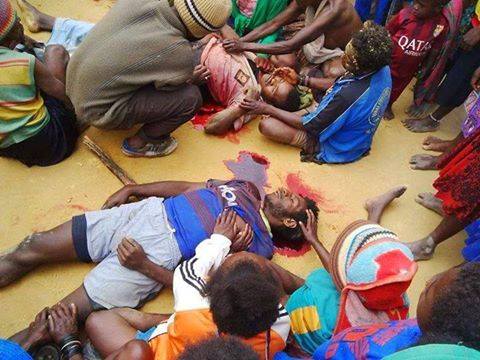Five teenagers were killed in the western region of Paniai in West Papua on Monday, and at least 12 injured, after Indonesian security forces shot into a crowd gathered in a field outside a nearby police station.
They were all civilians and not associated with any political group.
There are conflicting accounts about why the crowd were gathered, although local media are reporting it was to do with an incident that occurred the previous night, where Indonesian security forces allegedly assaulted a 12-year-old child.
Pictures depicting the dead have been shared across social media sites by West Papuan activists and supporters. They are graphic images that show victims with bloody head wounds, surrounded by mourners.

The UN Human Rights Office has already expressed alarm at the killings stating it has “been concerned about regular reports of violence in Papua in the last few years” and urged authorities to “facilitate an independent and thorough investigation” into the incidents.
Indonesian President Joko Widodo has promised to follow up the deaths, the Sydney Morning Herald has reported.
The Paniani region has been the target of brutal crackdowns by the Indonesian military which escalated following the launch of Operation Matoa in December 2011, designed to break a local armed resistance movement. This operation led to the displacement of an estimated 14,000 Indigenous West Papuans.
In April last year, political prisoner Selpius Bobaii raised concerns about the escalating “violence, intimidation and unlawful detentions” by police and military in the area in its bid to cut down on the separatist Free West Papua (OPM) movement in the area.
He said there had been an increased deployment of Indonesian military in the region since February 2013, with accusations of unlawful arrests, torture, and forced kidnappings in Paniai.
In September last year, West Papua Media reported three men had been shot by Brimob paramilitary police for refusing to shave during raids targeting men with long hair, long beards and dreadlocks – seen as symbols of pro-independence supporters.
The latest deaths in Paniai follow the formation of the United Liberation Movement for West Papua, formed after a meeting of West Papuan activists in Port Vila, Vanuatu last week.
The group will make an application to join the Melanesian Spearhead Group, which makes up the Melanesian states of Fiji, Papua New Guinea, Solomon Islands and Vanuatu, as well as the Kanak and Socialist National Liberation Front of New Caledonia.
West Papua has been under Indonesian rule since the ‘Act of Free Choice’ – commonly referred to as ‘The Act of No Free Choice' – was passed in 1969. It followed the withdrawal of the Dutch in the 1960s.
About 1,000 Papuans out of a population of 800,000 were hand-picked to vote, with concerns they were threatened or coerced into voting for the province to come under Indonesian rule.
Since then there have been constant concerns over human rights violations in the province and brutal and violent crackdowns on peaceful demonstrations. Activists have been jailed for raising the prohibited Morning Star flag.
The human rights violations in the province have remained largely hidden from the outside world, partly due to a strict media ban. Indonesia does not allow foreign journalists or media outlets into the country.
President Joko Widodo has promised to open up the province to foreign media, but doubt has been cast on his ability to improve the human rights situation following the appointment of his Defence Minister Ryamizard Ryacudu, who was involved in crushing the separatist movement in Aceh, and also infamously praised the soldiers who murdered Papuan leader Theys Eluay in 2001.
Donate To New Matilda
New Matilda is a small, independent media outlet. We survive through reader contributions, and never losing a lawsuit. If you got something from this article, giving something back helps us to continue speaking truth to power. Every little bit counts.



